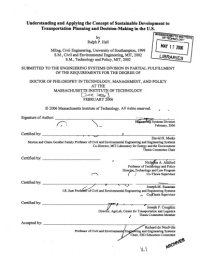This research demonstrates that sustainable development is a multidimensional concept that should be approached in a transdisciplinary manner. Its objective has been to synthesize and integrate disparate and currently unconnected lines of thought that have not yet been applied in a systematic way to promote sustainable development and sustainable transportation. The primary contribution of this research is the theoretical development of a decision-support framework that identifies the tools and approaches that decision-makers could/should use to create policies and programs that transition society towards sustainability. These tools and approaches are either articulated or developed by the author throughout the dissertation. Specific ideas explored include a Rawlsian/utilitarian decision-making philosophy; a hybrid trade-off/positional analysis framework that is presented as an alternative to benefit-cost analysis; ecological vs. environmental economics; participatory backcasting; and ways to stimulate disrupting and/or radical technological innovation. To identify gaps that exist between theory and practice, the approach embodied in the proposed sustainable transportation decision-support framework is compared with current metropolitan transportation planning and decision-making processes in the U.S. The framework is then used to consider how the U.S. federal government might move the nation's transportation system towards sustainability. Read more...
